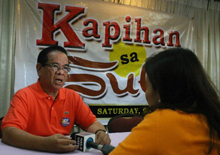Former Senator Francisco “Kit” Tatad today (February 26) called on Social Weather Station (SWS) and Pulse Asia to explain their polling errors and malpractices before continuing with their preelection surveys on the May 2010 elections.
Tatad said that SWS should first explain its fatally flawed Metro Manila exit poll of the 2004 elections, which totally missed the mark.
At the same time, he demanded that Pulse Asia disclose to the public how many candidates have paid how much to the polling firm in order to participate in and benefit from its surveys.
“I believe this is the irreducible minimum ethical and professional requirement before the two firms resume their unrestrained effort to shape public perceptions on the next presidential elections. Our people have a right to make this demand in light of the far from exemplary record of the two firms and the unaccountable power they now seem to possess,” Tatad said.
The former senator recalled the infamous SWS 2004 presidential elections exit poll in which SWS, within hours of the close of balloting on May 11, announced that the President Gloria Macapagal Arroyo got 31 percent of the votes in Metro Manila as against the opposition candidate Fernando Poe, Jr. who reportedly got 23 percent.
The SWS announcement was dutifully recorded around the world, landing on the pages of such reputable US newspapers as the New York Times and the Los Angeles Times, which both described SWS as a “respected forecaster.”
However, when the official Commission on Elections count came, Poe took Metro Manila with 1,452,380 votes or 36.67 percent of the votes, while Arroyo got 1,049,016 votes or 26.46 percent of the votes. FPJ won in all 15 Metro Manila cities and towns except Las Piñas, where he lost by a mere 1,876 votes.
Tatad said that this gross misreading of the results of the 2004 presidential polls by SWS ranks with the biggest polling errors in history, including the misreading of the 1948 US election which US pollsters predicted in favor of Tom Dewey over Harry Truman.
“SWS has shown serious limitations in its polling record. Yet despite those limitations, it once again seeks to foist itself upon us as a competent and faithful interpreter of public opinion as the campaign enters its critical stages,” Tatad said.
The ex-senator also said he would ask Pulse Asia to make a full disclosure of the services it has sold to politicians who are eager to rate in its surveys.
“Contrary to what appears to be sound ethical practice, the firm has been inviting politicians to participate in its surveys at the rate of P400,000 per head, and to introduce ‘rider’ questions about their candidacies at P100,000 each,” he said.
Tatad noted that the candidates’ names have never been published, and neither have the “rider” questions.
“Since the questionnaire forms the soul of any survey, it should be neutral and not biased for or against anyone. But the fact that paying politicians are allowed to contribute their own questions is not the best way of ensuring the neutrality and objectivity of the questions. And it does not prevent anyone from asking, what else is being sold aside from the questions?” Tatad said.
The former senator said it’s now time to make room for a new set of professionals so that opinion polling can be done according to the highest professional and ethical standards worthy of the whole-hearted support of the Filipino people. #



 Posted by kittatad
Posted by kittatad 

